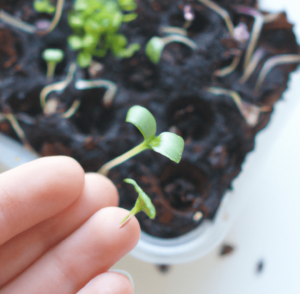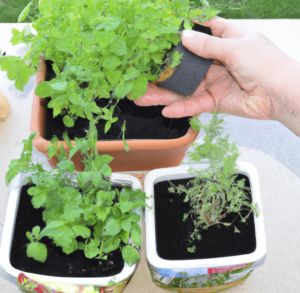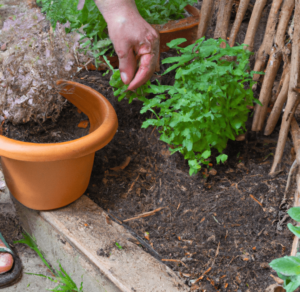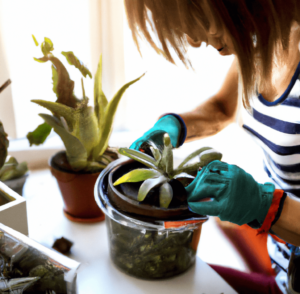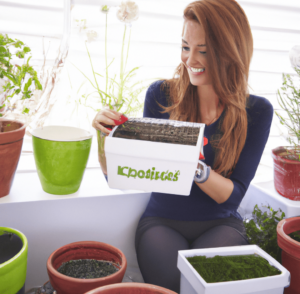Maybe you’ve learned how to grow flowers from seeds and want to gain a new skill. We recommend learning how to preserve herbs from your very garden. Don’t worry, we’ve got all the info here!
Harvesting and Timing
Learning how to grow herbs in containers or a garden is vital for harvesting herbs like rosemary. For the plants to create the optimum flavor and scent, timing is essential. Herbs should be taken from the garden right before flowering because this is the time when the essential oils, which are in charge of flavor and scent, are at their highest level.
Herbs that are planted in containers can be harvested whenever they are ready, although it is ideal to prune frequently to encourage development and keep the plant from getting too woody. It’s crucial to take into account a herb’s potency when utilizing it in cuisine and to regulate the quantity used properly.
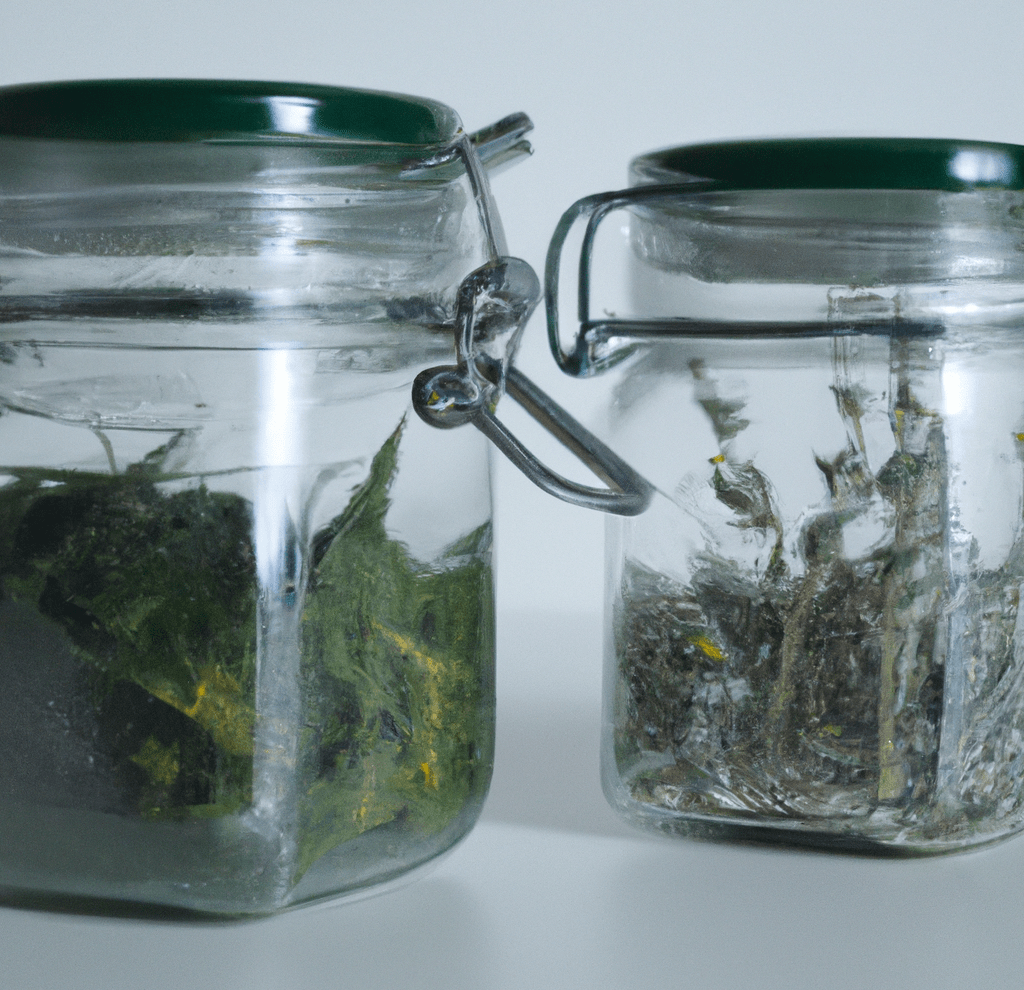
When to Harvest Herbs for Preservation
When you’re learning how to preserve herbs, you need to know basic gardening info like when you harvest them:
- Herbs should be harvested early in the day when the dew has dried but before the sun is fully up. When the oils in the herbs are at their highest concentration, the flavor and scent are at their fullest.
- Find out how your herbs grow, and pick them exactly as they start to flower. It is ideal to gather herbs before they flower since this preserves more of their flavor and perfume.
- Think about how you utilize the herb. It is better to gather the herb when the leaves are fully developed but not yet woody if you intend to use it in cooking. It is preferable to gather herbs like lavender that are used to make their essential oils when the blossoms are just starting to open.
When it comes time to preserve your herbs, you can make sure they are at their best by paying attention to these suggestions. You can eat fresh, flavorful herbs all year long if you use the appropriate timing and technique.
How to Properly Harvest Herbs
Now that you’re learning about how to preserve herbs, you can harvest them by:
- Harvest your herbs just before they flower for the best flavor because that is when their essential oils are at their highest.
- To trim stems, use clean, sharp shears or scissors to prevent crushing or injuring the plant.
- Cut stems about 1/4 inch above a leaf node, where new growth will appear, as a method. Remove the outside stems from bushes of herbs like rosemary to promote new growth and bushiness.
- Herbs can be dried by being tied together at the stems and hung in a dry, well-ventilated area. As an alternative, spread out the stems on a piece of paper and let them dry naturally for a few days.
- Store in an airtight jar after it has dried.
Drying Herbs
One of the oldest techniques for preserving herbs is drying, which is an easy process that may be carried out using a dehydrator or by air-drying. You can learn how to preserve herbs by removing the maximum amount of moisture while preserving their flavor and scent:
- To get rid of any dirt or debris, thoroughly rinse the herbs.
- The herbs should be spread out in a single layer on a drying rack or a spot that is clean and dry.
- Put the herbs in a paper bag if you’re air-drying them to keep out dust and other contaminants.
- Place the herbs away from direct sunlight in a warm, dry area with excellent airflow. If using a dehydrator, dry your herbs according to the manufacturer’s recommendations.
- To make sure the herbs are drying evenly, check on them frequently. To make sure the herbs are drying evenly, turn them or rearrange them as necessary.
- The herbs should feel crumbly and crisp to the touch once they have dried completely. To guarantee that the dried herbs maintain their flavor and aroma, store them in sealed containers away from heat and light.
Your herbs can be dried to retain their flavor and aroma for up to a year, allowing you to utilize them in cooking and other ways even when fresh herbs aren’t in season.
Techniques for Drying Herbs Such As Air Drying and Dehydrating
To really get into how to preserve herbs, you can use the following techniques:
- Herbs can be dried using the easy and time-tested process of air drying. It entails hanging bundles of herbs upside-down in a warm, dry area with excellent airflow after tying them together. Sage, rosemary, and other herbs with woody stems work well with this technique.
- Usually, the drying process takes 1-2 weeks. For sensitive plants with high moisture content, like basil, dehydration is a speedier way of herb drying. Herbs are spread out in a single layer on a dehydrator tray and dried until crisp at a low temperature (about 95°F). Typically, this procedure takes several hours. For a longer period of time, dehydrated herbs can also be kept in the freezer to preserve their quality.
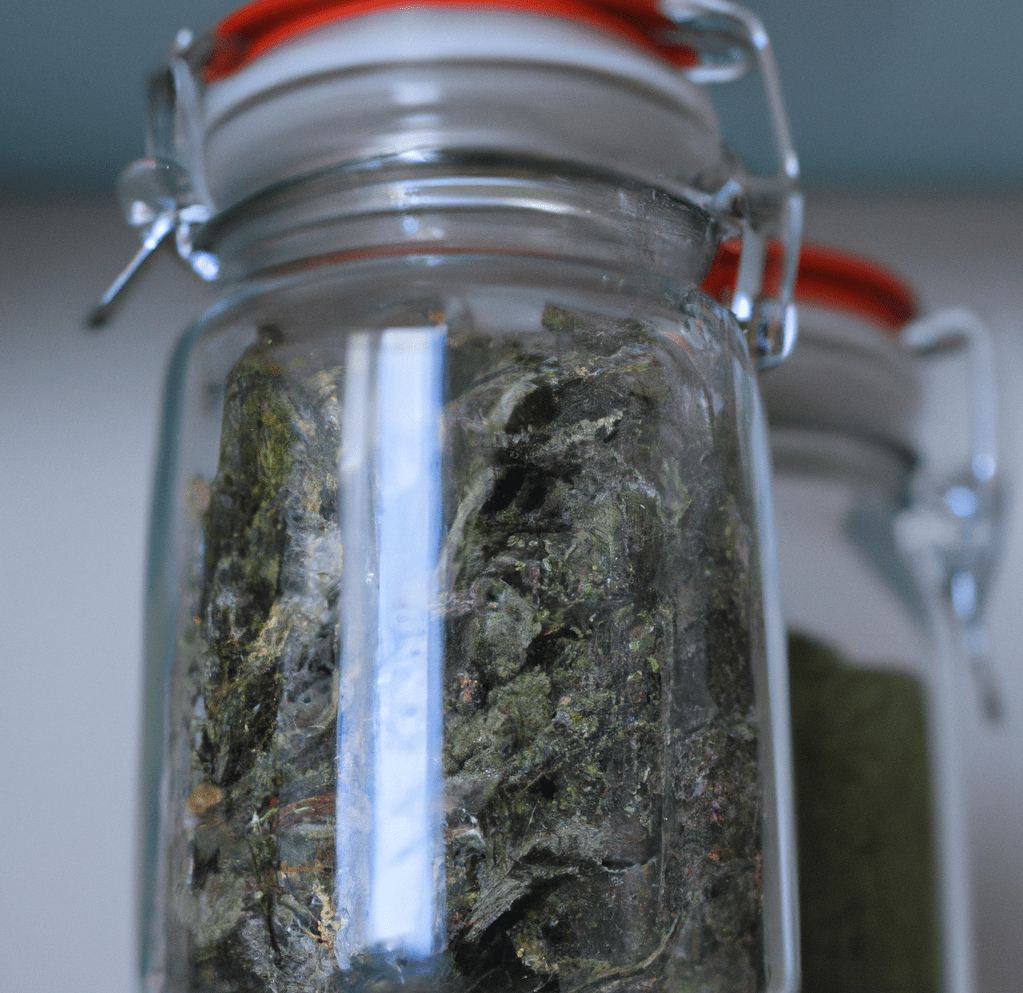
How to Store Dried Herbs
As you learn how to preserve herbs, keep the following in mind as you store them:
- Avoid moisture: Moisture can cause mold to grow and dried herbs to get spoiled. Make sure your herbs are completely dry before storing them and keep them somewhere dry to avoid this.
- Keep out of direct sunlight: Dried herbs’ flavor and color can be impacted by light, so store them in a cool, dark area, like a pantry or cupboard.
- Use airtight packaging Your herbs will stay fresher for longer if you store them in airtight containers like jars or plastic bags with a tight-fitting top.
- Herbs that have been dried tend to have their flavor concentrated, so preserving them whole can help maintain their strength. Alternatively, you can crush them before utilizing them. If you want to use them in recipes that call for a fine powder, you may also crush or grind them before storage.
- Avoid exposure to heat: Storing dried herbs close to machines that produce heat, like a stove or oven, can cause them to quickly decay and lose their flavor.
These straightforward suggestions will help you keep your dried herbs as fresh and flavorful as possible for as long as possible.
Freezing Herbs
Freezing is an easy and efficient way to keep herbs, whether you have excess from your garden or leftovers from a recipe. You can keep the following in mind as you continue to learn how to preserve herbs:
- Dry herbs completely before freezing. The herbs should be finely chopped and arranged on a baking sheet in a single layer. The herbs should freeze completely on the baking sheet after about two hours in the freezer. After the herbs have frozen, move them to a freezer-safe container, like a glass jar or a plastic bag. After writing the name of the herb and the date on the container, put it back in the freezer.
- Basil, cilantro, dill, parsley, and rosemary all freeze well. There is no need to defrost herbs before using them in your cuisine. Simply take the desired quantity out of the freezer, crush or cut as necessary, and add to your food. Herbs that have been frozen retain almost all of their original flavor and scent.
Techniques for Freezing Herbs Such As Whole, Chopped, or Blended
Say you’ve read all the gardening guides and you know how to preserve herbs. Here’s how to use them:
- Whole: In an airtight container or freezer bag, you can freeze whole herbs like rosemary, thyme, or bay leaves. To avoid freezer burn, make sure to drain any extra moisture before freezing.
- Chopped: To freeze chopped herbs, chop them up and add a little water or oil to an ice cube tray. Transfer the herb cubes to a freezer bag after they have frozen. This makes it simple to adjust your recipes by adding a cube or two as necessary.
- Paste: Blend the herbs with water or oil. For simple portion control, this can be frozen in freezer bags or ice cube trays. Simply defrost when ready to use, then incorporate it into your recipe as directed.
Techniques for Canning Herbs Such As Pickling and Making Herb-Infused Oils or Vinegars
Herbs can be canned to maintain their flavor and freshness for long-term storage. When you learn how to preserve herbs using this method, keep the following in mind:
- Herbs can be preserved using the easy and efficient method of pickling. Herbs can be pickled by putting them in sterilized jars with vinegar and spices, sealing the jars, and processing them in accordance with regular canning procedures. Herbs that have been pickled retain their flavor and scent and can be stored for up to a year in the pantry.
- Another well-liked method of canning involves infusing oils or vinegars with herbs. Simply add fresh or dried herbs to a bottle of oil or vinegar and let it sit for a few weeks to create herb-infused oils or vinegars. The resulting oil or vinegar will be flavor- and aroma-infused with the herbs and can be used as a finishing oil or vinegar or in cooking.
- To preserve their flavor and freshness, herbs should be stored in a cold, dark place and used within a year, whether you want to pickle them or infuse them. Herbs that have been canned shouldn’t be frozen because the freezing process can break the jars and cause the contents to deteriorate.
Safety Considerations When Canning Herbs
If you’ve learned how to preserve herbs with the canning method, keep these tips in mind:
- Using fresh herbs and boiling the water for at least one minute before pouring it over the herbs in the jar are essential when using the water canning method.
- It’s critical to check that the jar is correctly sealed and processed for the prescribed amount of time in a boiling water bath.
- Herbs must be completely dried before being placed in an airtight bag or jar when utilizing the dry canning method. This aids in limiting the development of mold and germs. To preserve their flavor and quality, dry herbs must be kept in a cold, dry environment.
To ensure the safety and quality of the preserved herbs, it is crucial to utilize high-quality ingredients and adhere to standard canning processes.
Preserving in Alcohol
Herbs can be stored for future use simply and effectively by being preserved in alcohol:
- Selecting your herbs: Choose the herbs you want to keep, such as basil, thyme, rosemary, or any other herb you choose.
- Herbs that have been carefully cleaned and dried should be used. They can be dried by being placed in a salad spinner or on a piece of paper.
- Assemble a container: The dried herbs should be put in a clean, airtight container, like a mason jar.
- Pour the booze in As you pour the alcohol over the herbs, be careful to completely submerge them. To make sure that the herbs are completely buried, you might need to gently press down on them.
- The container must be properly sealed before being stored in a cold, dark area.
- The herbs should steep. At least two weeks should pass for the herbs to fully infuse the alcohol, or until the alcohol has acquired the flavor and scent of the herbs.
- Remove the herbs from the alcohol after two weeks, reserving the infused alcohol. The herbs can be thrown away or used in recipes.
It can be stored in the refrigerator to increase its shelf life and preserve for up to 6 months. Herbs can be flavorfully and conveniently preserved in alcohol for subsequent use and they can be stored in the refrigerator to increase their shelf life and preserve for up to 6 months.
Techniques for Preserving Herbs in Alcohol Such As Making Herb-Infused Liqueurs or Tinctures
Herbs can be preserved in alcohol to retain their flavor and be used in cooking, cocktails, or as medicine:
- Liquors infused with herbs In this method, fresh or dried herbs are steeped for a number of weeks in high-proof alcohol, such as vodka. The liqueur that is produced can be either straight or as a sweetener for cocktails. It’s critical to utilize top-notch herbs and keep the infused liqueur in a cool, dark location.
- Herb tinctures are produced by steeping dried or fresh herbs in alcohol for a number of weeks, separating the resulting liquid, and bottling it. Tinctures can be used to treat illnesses or to add flavor to food and drinks. It’s crucial to utilize dried herbs of the highest caliber when producing tinctures and to keep the finished product in a cold, dark location.
Safety Considerations When Preserving Herbs in Alcohol
Although storing herbs in alcohol is a practical and flavorful approach, you’ll need to think about the following if you’ve used this method:
- Cleaning: It’s critical to make sure that all containers and tools used to preserve herbs in alcohol are sanitized and germ-free. This will ensure that the alcohol is safe for consumption and help avoid spoiling.
- Water content: Herbs with a lot of water, such as cilantro or basil, might make alcohol spoil more quickly. Prior to preserving herbs in alcohol, it’s critical to completely dry the herbs to reduce the likelihood of deterioration.
- Bacterial development: Because alcohol can foster the growth of germs, it’s crucial to keep herb-infused alcohol in the refrigerator and to use it within six months of purchase to maintain its safety.
- Strength of alcohol: The length of time that herbs can be preserved depends on the alcohol’s strength. While lesser alcohols like wine or beer can degrade more quickly, stronger alcohols like vodka or gin have a larger alcohol concentration and are less likely to facilitate the growth of bacteria.
When preserving herbs in alcohol, it’s crucial to use correct canning procedures in addition to these safety considerations. This involves making sure the alcohol is kept in a cool, dark location and the herbs are kept in a clean, sealed container.
Bottom Line: How to Preserve Herbs
Learning how to preserve herbs is a fantastic technique to prolong the shelf life of fresh herbs and benefit from their flavor all year long. There are various options, including freezing, water canning, dry canning, and alcohol preservation.
FAQs on How to Preserve Herbs
How can I keep my herbs fresh?
Herbs can be preserved in a number of ways, such as by freezing, drying, or putting them in an airtight container. It’s critical to gather the herbs right before they flower when they are at their height in order to preserve the most flavor and aroma.
When should herbs be harvested for preservation?
Since the essential oils in the herbs are at their peak concentration early in the day when the dew has dried but before the sun is completely up, it is ideal to gather herbs at this time. To retain the flavor and scent of herbs, harvest them just before they begin to bloom.
How should I gather herbs correctly?
To correctly harvest herbs, cut the stems 1/4 inch above a leaf node using clean, sharp shears or scissors. For the finest flavor, harvest just before blossoming. Before drying or storing the herbs, rinse them to get rid of any dirt or debris.
How should I dry my herbs?
Dehydrating or air drying are the two most popular methods for drying herbs. Herb bundles should be spread out in a single layer on a drying rack or hung upside-down in a warm, dry area with excellent airflow to air dry. Follow the manufacturer’s instructions for dehydrating. When the herbs are dried, store them in airtight containers away from heat and light.
How long will the flavor and aroma of dried herbs last?
If dried herbs are carefully stored in airtight containers away from heat and light, they can maintain their flavor and scent for up to a year.
What method of storing herbs is the oldest?
One of the earliest methods for preserving plants is drying.
What steps are involved in canning herbs?
You can pickle herbs in sterile jars with vinegar and spices or infuse oils or vinegars with fresh or dried herbs to preserve their flavor and freshness for long-term storage. It’s crucial to use premium ingredients, follow normal canning techniques, and store the preserved herbs in a cool, dark area.
What safety precautions should be taken when canning herbs?
To retain their flavor and make them safe for consumption, it is essential to follow safety procedures while preserving herbs. When utilizing the water canning method, entails using fresh herbs, heating the water for at least one minute before pouring it over the herbs in the jar, confirming that the jar is correctly sealed, and processing it for the appropriate period of time in boiling water bath. The herbs must also be properly dried before canning and kept in a cool, dry location.
How can you preserve herbs in alcohol?
Herbs can be kept for later use by extracting and keeping their flavor and aroma in alcoholic beverages like vodka or gin.


